Pregnant actresses: 'We're not treated like people'
- Published
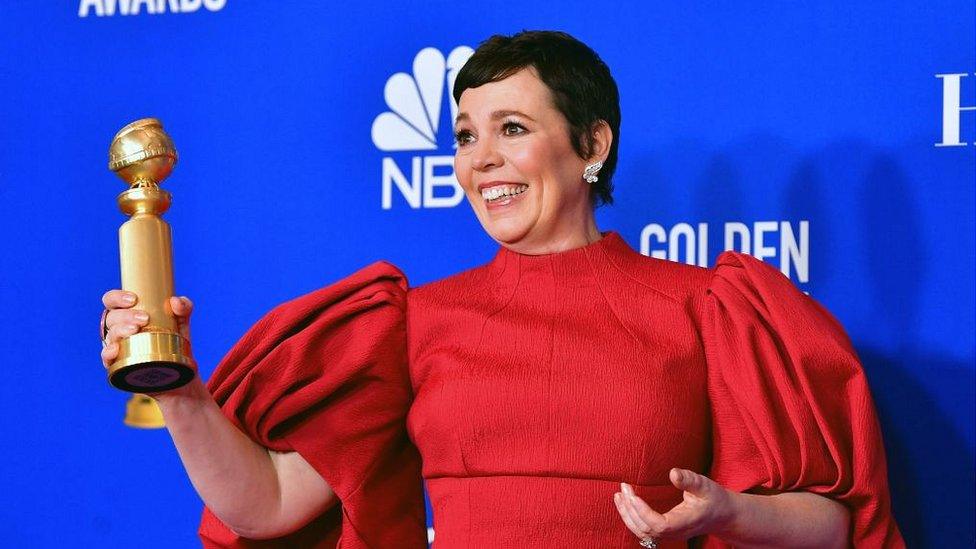
Olivia Colman's pregnancy was written in to BBC One's The Night Manager
Claire Danes's pregnant belly was hidden with computer graphics in the second season of Homeland, Olivia Colman hid hers in big sweaters during filming of The Night Manager. And when Gillian Anderson's bump could no longer be hidden on the X-files, "Scully" was abducted by aliens.
But not all actors are indulged by the production.
Those playing smaller parts in films and commercials often find they are forced to hide their pregnancies, not from the viewers but from people making the programmes themselves.
Some are successful, but many are mistreated by an industry marked by high staff turnover, an overabundance of competition and in some cases, a profound lack of respect.
Several women spoke to the BBC on the condition of anonymity. All say they lost jobs or auditions when it was found they were pregnant.
Either they were asked to disclose their pregnancy on a form before their audition, or they were asked in person during their interview.
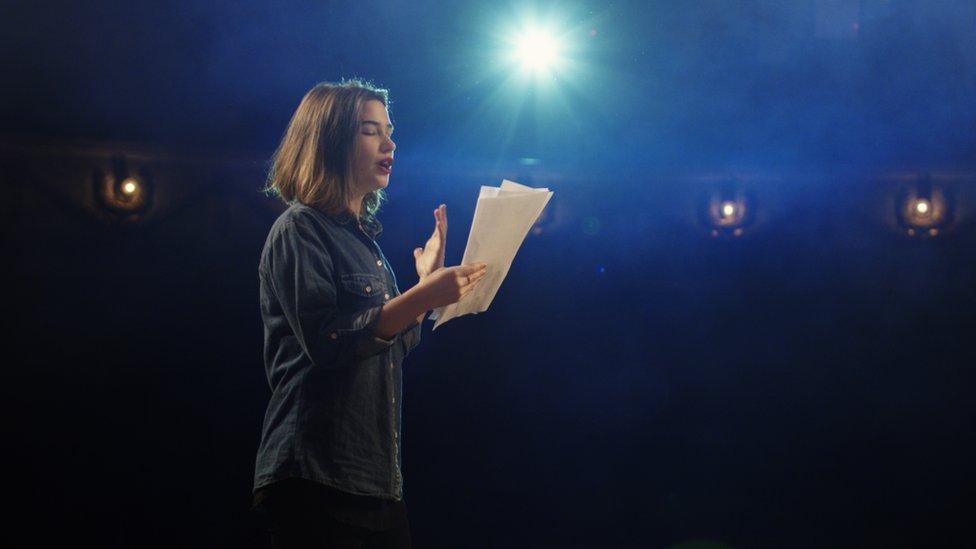
Actresses playing smaller parts often find they are forced to hide their pregnancies
Three who spoke to the BBC were not showing at the time their commercials would have been shot.
'I felt so weak'
Sarah (not her real name) describes herself as a jobbing actress. She mainly works on films and TV but commercials help her to pay the bills.
Early in her pregnancy, she had reservations about a commercial audition that her agent had scheduled. She decided to tell him her news and she expected the worst.
"But, he was brilliant," she says. He told her about her rights. How under the Equality Act, she was not required to disclose her pregnancy until 15 weeks before her due date.
"They are not allowed to discriminate against you," he promised.
The casting notice for the audition, often called a breakdown, said the ad might require some physical activity, but also mentioned a stunt double might be used for the more highly athletic moments.
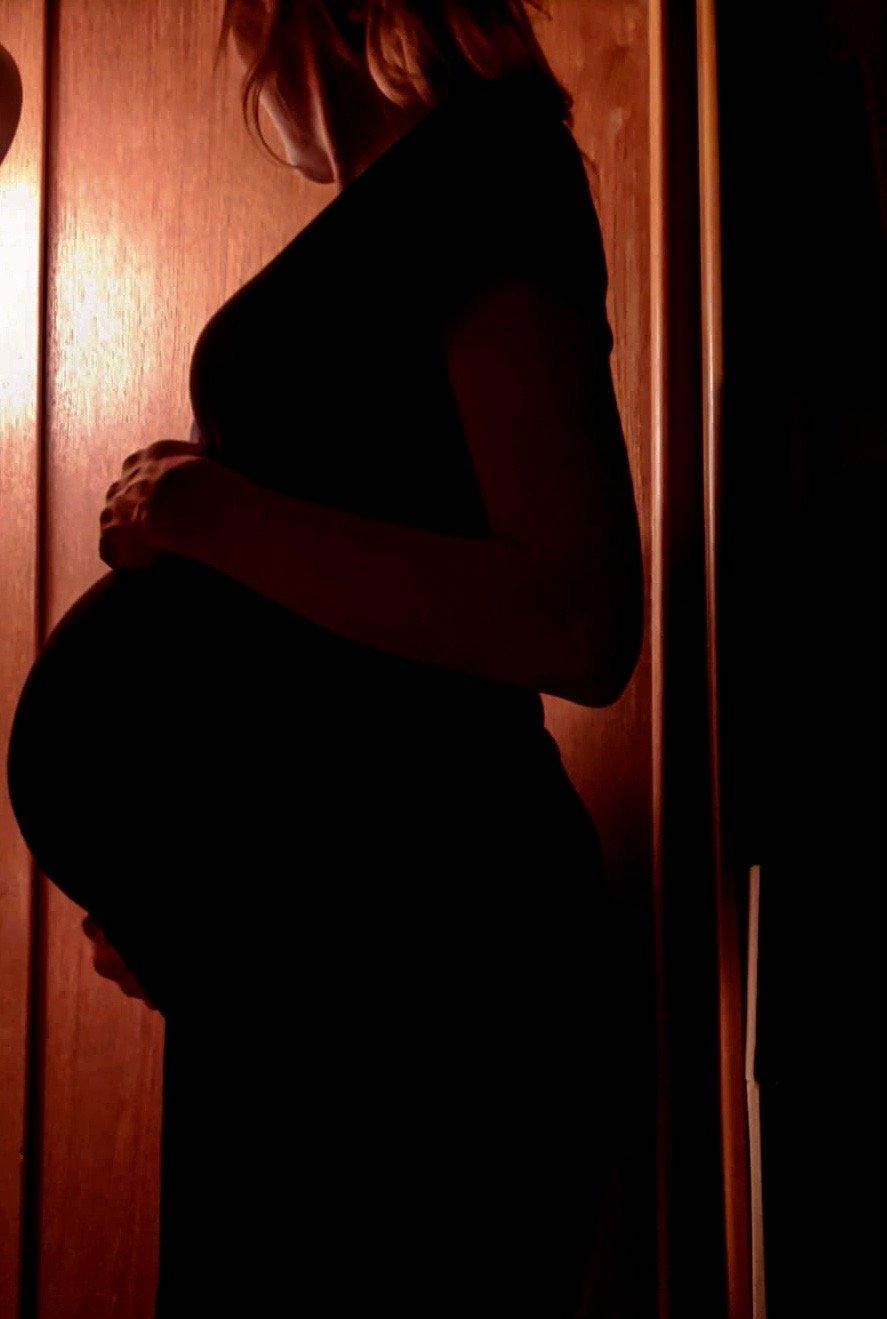
"It made me feel so unconfident about my pregnancy and my own physical ability"

Together, Sarah and her agent decided she should just go to the audition and see. "You always want to be ready and available for work," she says.
Her worry grew as she sat among the other actresses in the waiting area outside of the audition room.
Women coming out of the session were stressed and said the experience was physically taxing. Sarah was up next. Her name was called alongside another actress who was also auditioning for the same role. They went in as a pair to see the casting director.
The other woman was chosen first to read out the lines. Then the casting director turned to Sarah.
"You'll do the physical part. Are you fit?" she was asked. "I am fit, but I need to be safe," she said.
"Why?" said the casting director. "Because I am pregnant," said Sarah.
She says the casting director then became angry, saying: "Didn't you read the script? What did you think we were going to do today? I don't even understand why you have come. Don't you think it was a bad idea?"
Sarah says she felt humiliated, and froze.
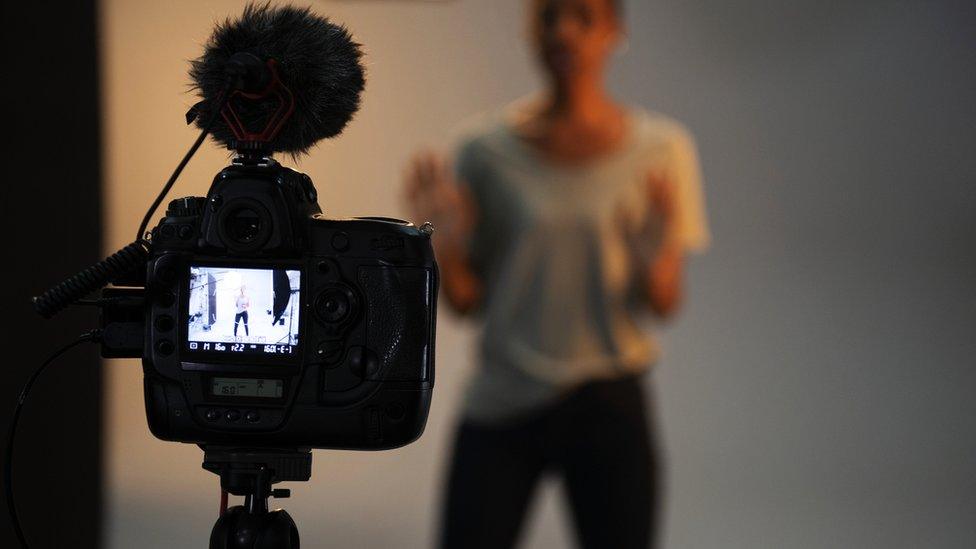
Legally, auditioning actors should not be asked personal questions about relationships or family planning
"I said to the casting director I'm so sorry for wasting your time, and then I even said to the other actress - I'm so sorry didn't mean to waste your time either".
"Then the casting director said, 'Yes, I think it's best if you leave'."
Sarah left the casting and once on the street, she burst into tears. "It made me feel so unconfident about my pregnancy and my own physical ability. It made me feel so weak."
Her "confidence was knocked," she says, until she won a role on a television series, where the production was much friendlier and had no problem shooting her from the bump up.
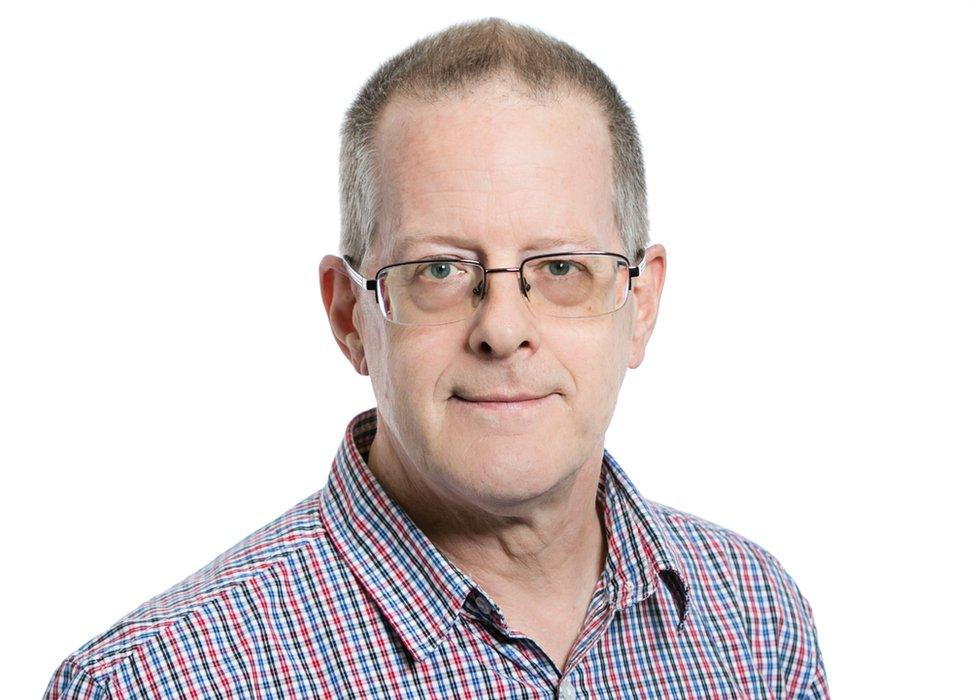
Tim Gale, head of commercials at Actors' Equity

Tim Gale, head of commercials at the actor's union, Equity, is well acquainted with standing up for his members on this issue.
"We used to get two to three calls a week but we get less than one a month now," says Mr Gale.
Sometimes, a form is provided in the waiting room which asks an actor to tick a box to say if they or their partner are expecting.
Actors of both sexes who sent the BBC copies of these forms, say that when they disclosed a pregnancy, jobs they had secured were either pulled or delayed.
A few said they spoke with the union and assumed the problem had been sorted after their particular situation was treated.
But Mr Gale says even in recent weeks, he has seen these forms pop up.
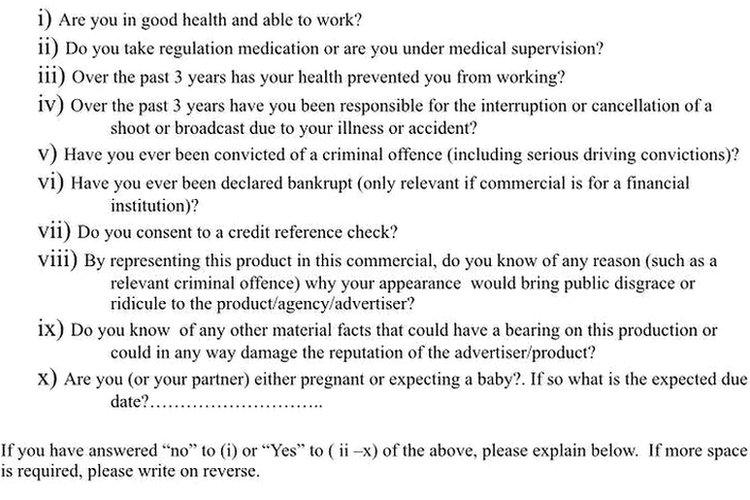

Actors' Equity along with the Casting Directors Association and the Institute of Practitioners in Advertising, have drafted an artist declaration form.
The form only asks an actor to disclose any reputational risk or any reason an actor might not be able to travel by plane. There is no mention of pregnancy.
The actor's union has lobbied production companies to use this new form, but there is such high staff turnover in production companies, the old forms keep popping up.
Sometimes the insurance companies that underwrite commercial productions demand such a form be used and Equity has had to fight this, too.
Pregnancy is not a disability under the Equality Act - and therefore insurance companies cannot demand the production company deny work to those expecting.
'A long road'
If an actress wins a role, an insurance company is allowed to ask after the health of an actress. Commercial productions only film for a day or two and an intense risk assessment is carried out to factor costs that might occur from a delay in shooting.
While it is not appropriate to ask at the job interview stage, once they are cast, the insurance company backing the production can ask, for example, if an actress is pregnant.
They can also raise their premiums if they find out a woman is pregnant, but extra costs have no impact on the law. The actress cannot be fired, as it would be discrimination.
However, experts say, the same insurance company could be liable if a director or producer misuses that information and the actress is fired.
"Things are much better than they were, even five years ago. But it has been a long road getting to this point," says Mr Gale.
The association which represents casting directors says it is not acceptable to ask actors if they are pregnant "before or at casting calls".
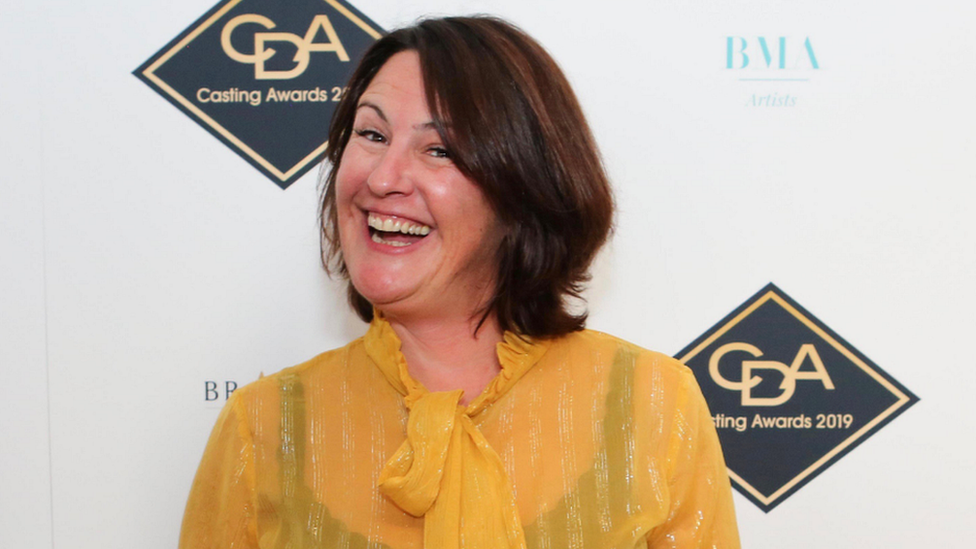
Kate Evans, chair of the Casting Directors Association
"If actors are pregnant, we would expect casting directors to support them, as well as those who may be breastfeeding or have childcare commitments," says Kate Evans the chair of the Casting Directors Association.
Know your rights
Many actors are unaware of their rights under the 2010 Equality Act. The Equality and Human Rights Commission - responsible for enforcing the act - says actors should not be asked any personal questions about relationships and family planning in interviews.
"Such attitudes are straight out of the dark ages and have no place in a modern working culture," says the Commission. "Everyone has the right to work and a working environment that allows them to achieve their full potential."
Katie Wood, a barrister for Maternity Action says sometimes the law is misinterpreted because employers think the Equality Act only covers full-time employees, but pregnancy rights extend to the self-employed as well.
"To ask someone about whether their partner was pregnant holds the potential for associative discrimination," she says.
English case law on actors is varied and in some results, actors have been categorised as "service providers", external. This means they work like a sole trader who might provide a service to a company, much like a plumber. But Ms Wood says even then, the Equality Act applies.
'Lonely experience'
One actress tells the BBC that she continued to work because she just "flat out refused" to mention her pregnancy. "I didn't tell my agent. I didn't tell anyone. I was afraid it would cost me work."
She was cast in a film and between the costume fitting and the movie shoot there were a couple of weeks.
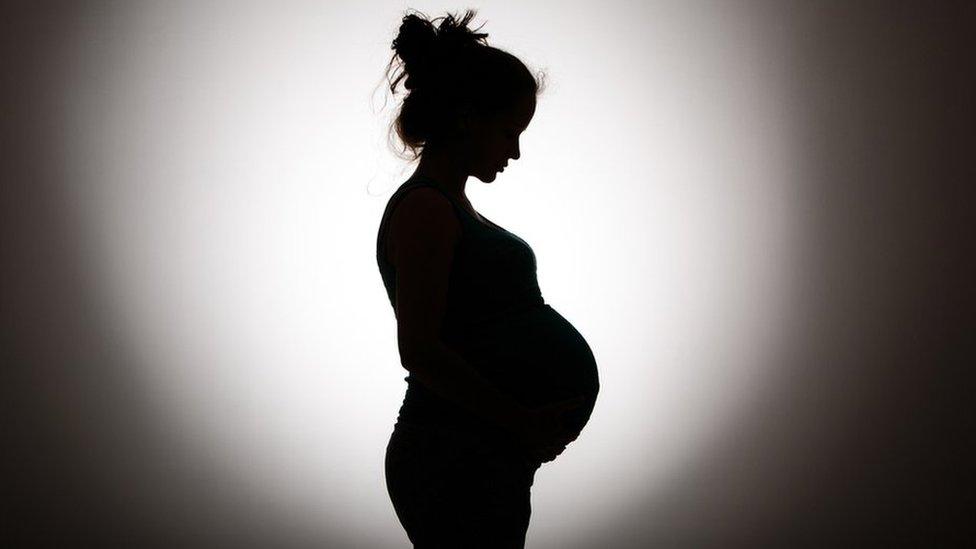
Secret pregnancy: "I didn't tell my agent, I didn't tell anyone. I was afraid it would cost me work"
"When I put on my costume I had definitely gained weight. They asked, 'what happened?' And I just threw up my hands and said, 'Oh, yeah. I wonder why'."
She did not know what her rights were and she felt it was just better to keep it a secret because actors are "so easily replaceable".
Having courage was hard, she says. "I had such bad sickness in the beginning, but couldn't tell anyone. I was also nervous because what if something went wrong?
"What should have been such a natural thing was a really lonely experience."
Another actress agrees: "As actors, we are not treated like people. It's like we just don't matter."